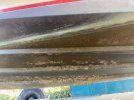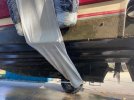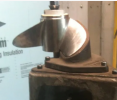Copied and pasted.
If you've ever taken the same boat from a lake to the ocean and thought, "This feels different," you're not imagining things.

boattest.com
Why Boats Perform Differently in Salt Water vs. Fresh water
If you've ever taken the same boat from a lake to the ocean and thought, "This feels different," you're not imagining things. There are subtle yet significant differences in the way a boat behaves depending on whether it's in salt water or fresh. These changes are largely due to physical properties like density, viscosity, and buoyancy-and they influence everything from fuel economy to handling.
Understanding these factors can help boat owners and captains better anticipate how their vessel will perform, depending on the body of water they're in.
Side by side of boats, one on lake and one on ocean
Density: Seawater Gives You a Lift
Freshwater has a density of about 1.000 g/cm³ at 20°C (68°F). Seawater, thanks to its roughly 3.5% salt and mineral content, is denser-around 1.025 to 1.030 g/cm³ at the same temperature. That small change-just 2.5 to 3%-makes a noticeable difference in how a boat floats.
Boats sit higher in saltwater than in freshwater. This means less hull is submerged, which generally reduces hydrodynamic drag. That reduced drag can result in better fuel efficiency and slightly higher speed. It can also change the trim and balance of the boat, especially if the weight distribution was optimized for freshwater.
When a boat floats higher in saltwater, the reduction in wetted surface area not only improves performance but also affects stability. That's why careful operators often recalibrate trim tabs or ballast slightly when transitioning from lake to ocean.
Viscosity: Thicker Than Water... Barely
Viscosity is a fluid's resistance to flow. It influences how easily water slides past the hull and how well the propeller can push against it. At 20°C, freshwater has a dynamic viscosity of about 1.002 centipoise (cP). Seawater is slightly more viscous, at around 1.08 to 1.20 cP, depending on temperature and salinity.
While that difference might seem trivial, it has a measurable impact at high speeds or in finely tuned propulsion systems. Higher viscosity means slightly more friction along the hull. But it also improves propeller grip, especially when pushing heavier boats or accelerating from a stop.
As a result, many boaters notice that their vessel responds faster to throttle in saltwater than in freshwater, particularly with properly pitched propellers





